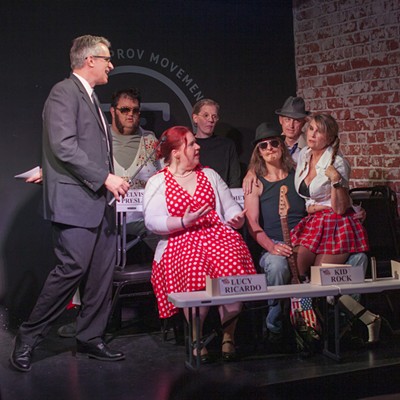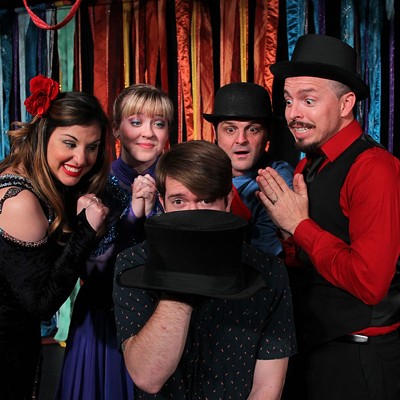Seven times a widow, Fay McMahon is a shapely private nurse in a bouffant hairdo and racy fishnets flashing below the hem of her regulation uniform.
Fay is working hard to line up her eighth husband, and it doesn't seem to matter whether he's the husband of her recently deceased patient, their petty criminal son or that shifty mortuary worker who always seems to be hanging about. She'll simply choose whichever fellow can finagle his way into the old lady's inheritance, or whoever can lay his hands on the money from a recent heist.
In Live Theatre Workshop's production of Joe Orton's 1965 comedy, Loot, Fay is the play's center of energy and the ever-enticing object of fascination for the men around her. As played by Tucson theater veteran Rhonda Hallquist, who is as good at comedy as she is at drama, Fay is not entirely heartless; she's just a gal trying to get ahead, using whatever means are available to her.
While Fay helps the household prepare for the funeral, we learn of a recent robbery in the neighborhood, and we soon find that the cash from it is being stored in a locked closet in the same room where the body of the deceased is being viewed. And then the cash ends up in the coffin, and the body is in the closet. And then the body is wrapped like a mummy and carted about the house, and the coffin is dragged back and forth, bank notes spilling every which way. To describe exactly how all this unfolds would ruin the delicious revelations, and it doesn't make much sense anyway.
The broad satire becomes funnier as the play progresses because the action is so blatantly transparent. Even Truscott, the undercover police detective pretending to be from the local water board, at first doesn't seem to see through the complex machinations.
As you might guess, the action necessitates a large amount of complex, breakneck-speed stage business. Director Annette Hillman stages the activity with whiplash energy and coaxes from her actors generous amounts of robust comedy with a minimum of wide-eyed buffoonery.
Hallquist is superb throughout, her comic timing helping to propel the play's momentum. So, too, is Michael F. Woodson as Mr. McLeavy, the sputtering widower who is as devoted to the authority of the Roman Catholic church as he is to the prowess of Scotland Yard and his local government. Stephen Frankenfield is charmingly manic as Dennis, the criminal-cum-undertaker.
Steve Wood shines in the role of Hal McLeavy, who is perhaps the most complicated character in the play. He is an unrepentant thief and womanizer who frequently extols the pleasures of brothels, but also is a devout Catholic who cannot tell a lie. Because he comes off as a flamboyant cross between Tim Curry and Freddie Mercury, you wonder if this character's bluff machismo is a ruse. Hal seems to hide a latent love for his mate Dennis, especially because whenever he calls his friend "baby," it sounds like a lover's endearment rather than '60s hipster conceit.
Also deserving praise is the excellent Nick Trice, who seems to be a late addition to the case as Truscott; when press releases went out last month, another actor had been announced in the role. Trice handles himself coolly as the supercilious detective. He's rather obsessed with Sherlock Holmes, wont to pull out a magnifying glass to examine clues and often puffing on an unlit pipe.
In the context of a madcap farce, Loot uses the bawdy promiscuity of swinging '60s London to head-butt working-class values, Catholic hypocrisy and police corruption. It's a bit politically incorrect, at times, casually making reference to rape, featuring scenes in which a corpse is treated with disrespect and including a prominent F-bomb. But, we in the audience can learn much about ourselves when we observe our reactions to this material.
Loot manages to cannily satirize issues such as bereavement and the handling of the dead as pointedly as does Evelyn Waugh's The Loved One. Like that novel, Loot also includes enough British jargon and situations to confuse some American audiences not schooled well enough by Monty Python's Flying Circus and Masterpiece Theatre. Therefore, LTW has seen fit to include a glossary in its program, explaining for those in attendance the meanings of such slang as "bird," "nicked," "quid" and "M.P." It also defines "papal dispensation," "fait accompli" and "muezzin," none of which is obscure enough to cause my spell-checker to raise its eyebrows.











